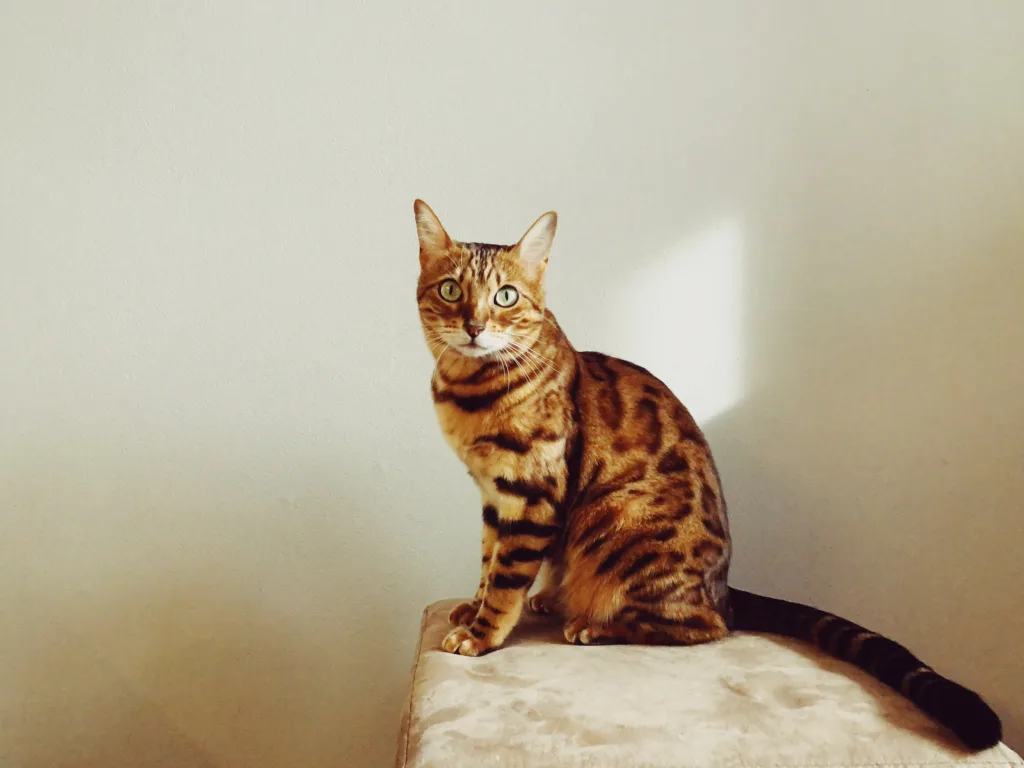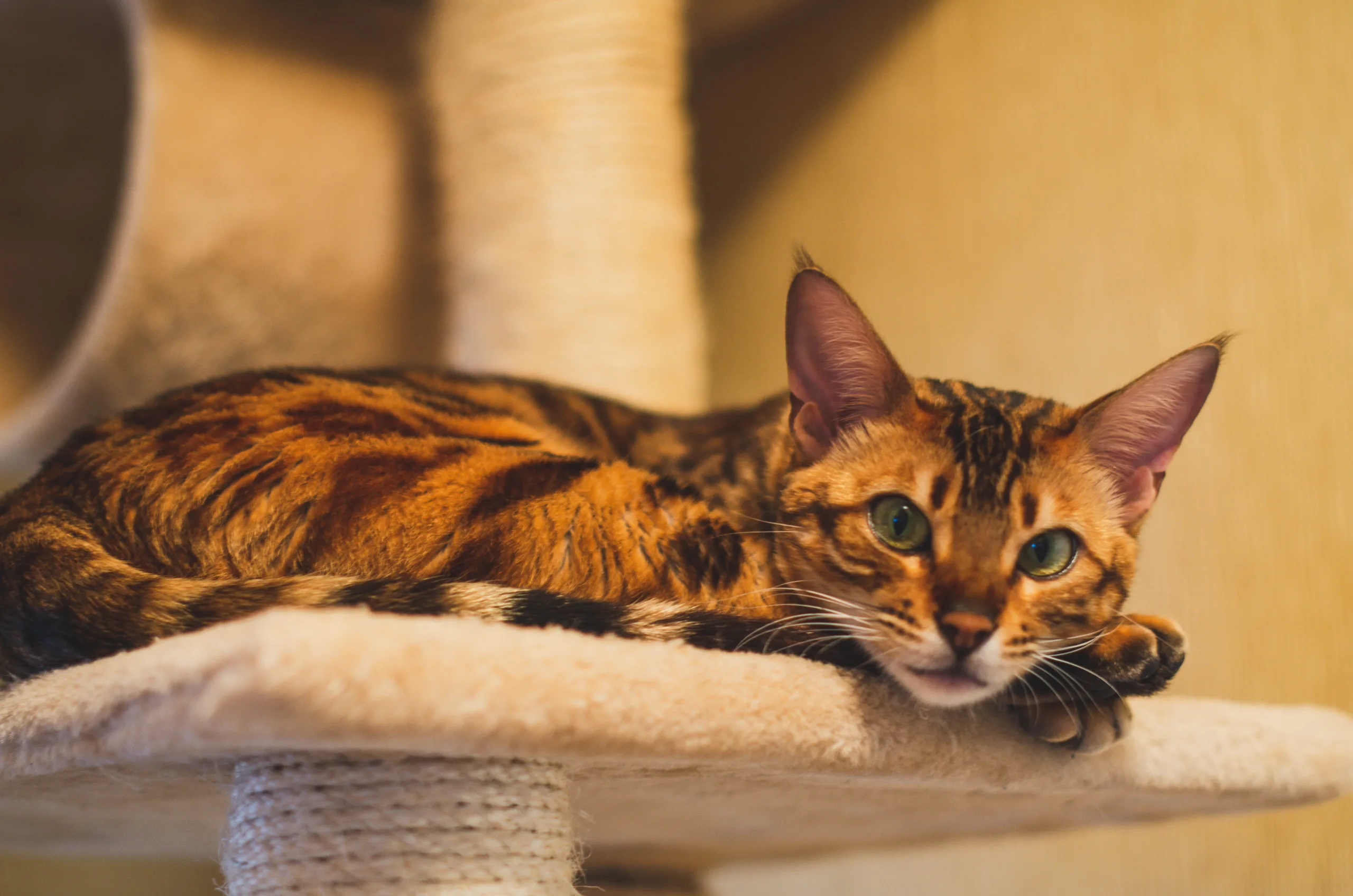Introduction
Bengal cats are a captivating and distinctive breed known for their striking coat patterns, athletic build, and playful personalities. As one of the newer cat breeds, they have quickly gained popularity among cat enthusiasts and pet owners alike. However, one question that often arises is: “How long do Bengal cats live?” Understanding the lifespan of these magnificent felines is crucial for providing them with the best care and ensuring their well-being throughout their lives.
Bengal cats are a result of crossbreeding between domestic cats and the Asian leopard cat, resulting in a breed that exhibits wild-looking markings. They have a sleek and muscular physique, with their soft, short fur showcasing vibrant spots or marbled patterns in various shades of brown, silver, or snow. This breed is also known for its highly active and curious nature, making them delightful companions for those seeking an energetic and engaging feline companion.
The lifespan of Bengal cats is a topic of great interest for prospective owners and those who already share their lives with these beautiful creatures. By delving into their average lifespan and understanding the factors that influence it, we can ensure that our Bengal cats live long, healthy, and fulfilling lives. Let’s explore the factors that contribute to the lifespan of Bengal cats, ensuring we can provide them with the care they need and deserve.
Factors Affecting the Lifespan of Bengal Cats
- Genetic Background
The genetic background of Bengal cats plays a critical role in determining their lifespan. When considering adopting a Bengal cat, it is essential to choose a reputable breeder who prioritizes the health and well-being of their cats. A responsible breeder will carefully select breeding pairs, ensuring they are free from hereditary diseases and genetic abnormalities. By selecting a Bengal cat with a healthy genetic background, you can increase the chances of a longer lifespan for your feline companion.
- Diet and Nutrition
Proper nutrition is vital for the longevity of Bengal cats. A well-balanced diet supports their overall health, strengthens their immune system, and helps prevent certain health issues. Provide your Bengal cat with high-quality cat food that is specifically formulated to meet their nutritional needs. Look for food that contains high levels of protein, essential fatty acids, and a proper balance of vitamins and minerals. Consult with your veterinarian to determine the ideal portion sizes and feeding schedule based on your Bengal cat’s age, weight, and activity level.
- Exercise and Mental Stimulation
Bengal cats are highly active and intelligent creatures. Regular exercise and mental stimulation are crucial to their well-being and lifespan. Engage your Bengal cat in interactive play sessions using toys that encourage them to chase, pounce, and jump. Consider providing scratching posts, climbing trees, and puzzle toys to keep them physically and mentally stimulated. By incorporating regular exercise and mental enrichment into their daily routine, you can help prevent obesity, promote a healthy weight, and ensure their overall well-being.

- Preventive Veterinary Care
Routine veterinary care is essential for maintaining the health and extending the lifespan of Bengal cats. Regular check-ups with a veterinarian allow for early detection and treatment of any potential health issues. Vaccinations protect Bengal cats from common infectious diseases, while preventive measures such as parasite control help keep them free from external and internal parasites. Follow your veterinarian’s recommended schedule for vaccinations, check-ups, and preventive treatments to ensure your Bengal cat’s optimal health and longevity.
- Environmental Factors
The environment in which a Bengal cat lives greatly impacts their lifespan. Create a safe and enriched environment that supports their natural instincts and behaviors. Provide scratching posts to satisfy their need to scratch, hiding spots for privacy and security, and elevated perches to satisfy their desire to climb and observe their surroundings. Bengal cats thrive in an environment that allows them to express their natural behaviors and provides ample opportunities for exercise, mental stimulation, and exploration.
By considering these factors and implementing appropriate care practices, you can enhance the lifespan of your Bengal cat and provide them with a happy and fulfilling life.
Common Health Issues in Bengal Cats
Bengal cats, like any other breed, may be prone to certain health issues. Understanding these common health concerns can help you identify symptoms early, seek appropriate treatment, and take preventive measures to ensure your Bengal cat’s well-being. Here are some of the common health issues that Bengal cats may face:
- Hypertrophic Cardiomyopathy (HCM):
- HCM is a heart condition that affects the muscle walls of the heart, leading to thickening and decreased heart function.
- Symptoms may include difficulty breathing, lethargy, reduced appetite, and sudden collapse.
- Treatment options depend on the severity of the condition and may include medications to manage symptoms and improve heart function.
- Regular veterinary check-ups, including cardiac screenings, can help detect HCM early.
- Progressive Retinal Atrophy (PRA):
- PRA is an inherited eye disorder that gradually leads to the degeneration of the retina, resulting in progressive vision loss.
- Symptoms may include night blindness, dilated pupils, and loss of peripheral vision.
- Unfortunately, there is no cure for PRA. However, supportive care can be provided to help manage the condition and ensure a comfortable life for the affected cat.
- Genetic testing and regular eye examinations can help identify Bengal cats at risk of developing PRA.
- Flat Chested Kitten Syndrome (FCKS):
- FCKS is a congenital condition that affects the chest development of kittens, resulting in a flattened ribcage.
- Symptoms include difficulty breathing, decreased appetite, and stunted growth.
- Treatment involves supportive care, such as supplemental oxygen, feeding assistance, and monitoring the kitten’s growth and development.
- Breeding practices that avoid mating cats with a history of FCKS can help reduce the occurrence of this condition.
It’s important to note that not all Bengal cats will experience these health issues, and responsible breeding practices can help minimize the risk. Regular veterinary check-ups, a balanced diet, and a stimulating environment can contribute to the overall health and well-being of your Bengal cat. If you notice any concerning symptoms, consult with your veterinarian for proper diagnosis and treatment options.
Tips for Promoting a Long and Happy Life
To ensure a long and happy life for your Bengal cat, there are several actionable tips and practices you can incorporate into their daily routine. By following these suggestions, you can enhance their overall well-being and promote a healthy and fulfilling life:
- Maintain a Consistent Daily Routine:
- Establish a regular schedule for feeding, playtime, and rest to provide a sense of stability and security for your Bengal cat.
- Cats thrive on routine, and a consistent daily schedule helps reduce stress and anxiety.
- Provide Interactive Playtime:
- Engage your Bengal cat in regular interactive play sessions using toys such as wand teasers, puzzle toys, or laser pointers.
- Playtime not only provides physical exercise but also mental stimulation, satisfying their hunting instincts and keeping them mentally sharp.
- Create a Stress-Free Environment:
- Ensure your Bengal cat has a safe and peaceful environment where they can retreat and relax.
- Provide hiding spots, cozy beds, and elevated perches to give them a sense of security and privacy.
- Minimize loud noises, sudden changes, and stressful situations to create a calm and stress-free atmosphere.
- Monitor Weight and Prevent Obesity:
- Obesity can lead to various health issues and shorten your Bengal cat’s lifespan.
- Provide a balanced diet with appropriate portion sizes to maintain a healthy weight.
- Avoid free-feeding and consult with your veterinarian for guidance on feeding schedules and calorie requirements.
- Regular Grooming and Dental Care:
- Brush your Bengal cat’s coat regularly to prevent matting and remove loose hair.
- Trim their nails as needed and clean their ears to prevent infections.
- Schedule regular dental check-ups and practice good dental hygiene, such as brushing their teeth, to prevent dental problems.
By incorporating these tips into your Bengal cat’s care routine, you can ensure their physical and emotional well-being, promote longevity, and strengthen the bond you share with your feline companion. Remember to consult with your veterinarian for personalized advice based on your cat’s specific needs and health condition.
FAQs on How Long Does Bengal Cats Live?
Here are some frequently asked questions about Bengal cats and their lifespan:
- Is 13 old for a Bengal cat?
- While the lifespan of Bengal cats can vary, reaching the age of 13 is considered a good milestone for a Bengal cat. With proper care and a healthy lifestyle, Bengal cats can live well into their teens and sometimes even longer.
- What is the oldest Bengal cat ever?
- The oldest recorded Bengal cat lived to be around 24 years old. However, it’s important to note that individual lifespans can vary based on factors such as genetics, care, and overall health.
- Is 14 old for a Bengal cat?
- Yes, reaching the age of 14 is considered quite a significant milestone for a Bengal cat. It indicates that they have been well-cared for and have lived a long and fulfilling life. Regular veterinary check-ups and a healthy lifestyle contribute to their longevity.
- How long do black Bengal cats live?
- The lifespan of black Bengal cats is not significantly different from other coat color variations of the breed. On average, Bengal cats can live anywhere between 12 to 16 years or even longer with proper care.
It’s important to remember that these lifespan ranges are approximate, and individual cats may have different experiences. Providing a loving and nurturing environment, along with regular veterinary care, balanced nutrition, and mental stimulation, can contribute to a longer and healthier life for your Bengal cat.
Conclusion
In conclusion, Bengal cats are unique and captivating creatures known for their striking appearance and playful nature. Understanding the factors that contribute to their lifespan is crucial for providing them with the best care and ensuring a long and fulfilling life. Here are the key points to remember:
- Bengal cats’ lifespan is influenced by various factors, including genetics, diet and nutrition, exercise and mental stimulation, preventive veterinary care, and their environment.
- Selecting a reputable breeder with a focus on healthy genetic backgrounds is essential for the longevity of Bengal cats.
- Providing a well-balanced diet, appropriate portion sizes, and regular feeding schedules contributes to their overall health and lifespan.
- Bengal cats are highly active, and engaging them in regular exercise and providing mental stimulation is important for their well-being.
- Regular veterinary check-ups, vaccinations, and preventive care are necessary to detect and manage any health issues.
- Creating a safe and enriched environment with scratching posts, hiding spots, and elevated perches promotes their physical and mental well-being.
- Bengal cats may be prone to certain health issues such as hypertrophic cardiomyopathy (HCM), progressive retinal atrophy (PRA), and flat chested kitten syndrome (FCKS), so monitoring for symptoms and seeking appropriate veterinary care is crucial.
By implementing the tips provided and prioritizing proper care, nutrition, and regular veterinary check-ups, you can ensure that your Bengal cat lives a long and fulfilling life. The bond you share with your feline companion will flourish, and you will witness their vibrant personality and unique qualities for years to come. Remember, your Bengal cat’s well-being is in your hands, so make their health and happiness a top priority.
For more click here
